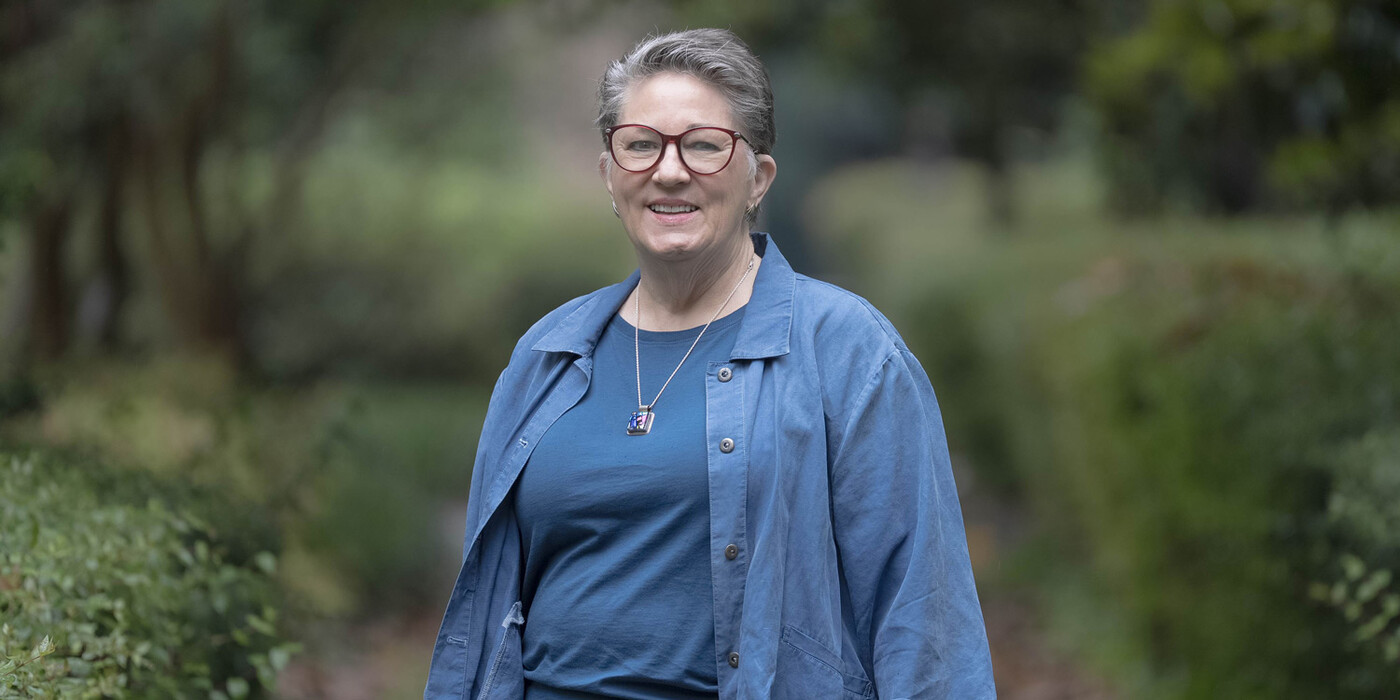Después de que un procedimiento fallido de cálculo renal dejara a Anna Smith con un solo riñón, encontró expertos en cálculos renales en los que podía confiar en Duke Health. Cuando necesitó que le extrajeran grandes piedras, Smith viajó por todas partes, incluso desde Hawái, para ver a Duke urologists. "Sobrevolé muchos centros médicos importantes para llegar a Duke", dijo Smith. "No podría imaginar ir a ningún otro lugar".
Un diagnóstico que cambia la vida
Smith tenía poco más de 20 años cuando descubrió que tenía cistinuria, una rara condición genética que causa cálculos renales. Cuando una tomografía mostró que tenía varios cálculos renales grandes, Smith se sometió a un procedimiento estándar en su localidad en Mississippi. No fue bien y terminó con la extirpación de un riñón. "Fue muy frustrante", dijo Smith.
Encontrar expertos en cálculo renal en Duke
Años después, Smith residía en Hawái cuando experimentó una obstrucción en el uréter que interrumpió el flujo de orina. Fue trasladada con vida a un hospital en Honolulu, donde se le insertó un pequeño tubo de plástico temporal llamado stent en el uréter y luego se le envió a casa a la espera de más tratamiento.
Inquieto por la situación, el padre de Smith, médico de familia, la instó a buscar atención inmediata. "Llamó a colegas y preguntó por los mejores especialistas en cálculo renal y lo derivaron a Duke", comentó. Smith voló de Hawái a Duke, donde se sometió a un procedimiento de litotricia, que rompió el cálculo renal en piezas más pequeñas, similares al polvo, que podía eliminar a través de la orina.
Más cálculos renales décadas después
Smith pasó más de dos décadas sin complicaciones. Se mudó a Asheville y tuvo chequeos regulares hasta que un día sus análisis de sangre indicaron que tenía disminución de la función renal. "Pensé que debía tener un cálculo, así que pedí un ultrasonido", explicó. Smith tenía razón. Los estudios de imágenes mostraron que tenía un cálculo grande en el riñón, que probablemente había estado creciendo durante años. Cuando su médico la derivó a un especialista en urología local, Smith le dijo que iba a Duke.
De regreso a Duke para otro procedimiento de cálculo renal
Smith se reunió con el especialista en urología de Duke Health Robert Medairos, MD, quien le habló sobre dos opciones:
- Nefrolitotomía percutánea (PCNL): Se realiza una pequeña incisión en la piel, a través de la cual se inserta un tubo en el riñón para descomponer y succionar los cálculos.
- Ureteroscopia: Se inserta un scope pequeño y flexible a través del uréter para alcanzar el riñón. Con un láser, las piedras se fragmentan en pequeñas piezas y polvo.
"La manera en que me presentaron las opciones me hizo sentir que era una verdadera colaboración", comentó Smith.
Smith quería la cirugía de PCNL lo antes posible, por lo que la programó con el especialista en urología de Duke Health Jodi Antonelli, MD. "Anna realmente tuvo la oportunidad de experimentar nuestro enfoque colaborativo en el cuidado de cálculos", dijo el Dr. Antonelli.
Optando por el plan B
En agosto de 2024, el Dr. Antonelli intentó el procedimiento de PCNL en Smith, pero rápidamente se dio cuenta de que no era la opción más segura. "La anatomía renal de ella era muy delicada", explicó el Dr. Antonelli. No quería continuar con este enfoque más invasivo, dado que terminó perdiendo su riñón cuando alguien más lo intentó hace 20 años. En cambio, el Dr. Antonelli colocó un stent en el uréter de Smith en preparación para una ureteroscopia semanas después.
El Dr. Antonelli realizó la ureteroscopia utilizando una nueva tecnología desarrollada con la ayuda del especialista en urología de Duke Health Glenn M. Preminger, MD. El Sistema de Vacío e Irrigación Continuo (CVAC) es un ureteroscopio que se puede introducir desde la vejiga hasta el riñón y permite la succión de polvo de piedra y fragmentos generados por un láser, en lugar de dejarlos pasar a través de la orina. "El uso de succión en ureteroscopia es un cambio radical", dijo el Dr. Antonelli. Significaba que podía optar por la alternativa menos invasiva y aún así obtener los beneficios de la extracción de los fragmentos.
Casi un año después, libre de piedras
Casi un año después, Smith está libre de cálculos renales. Siente agradecimiento a los especialistas en cálculo renal de Duke y se alegra de estar más cerca de los médicos en los que confía. "Mi experiencia siempre ha sido fantástica", dijo Smith. "Siento agradecimiento por Duke..






